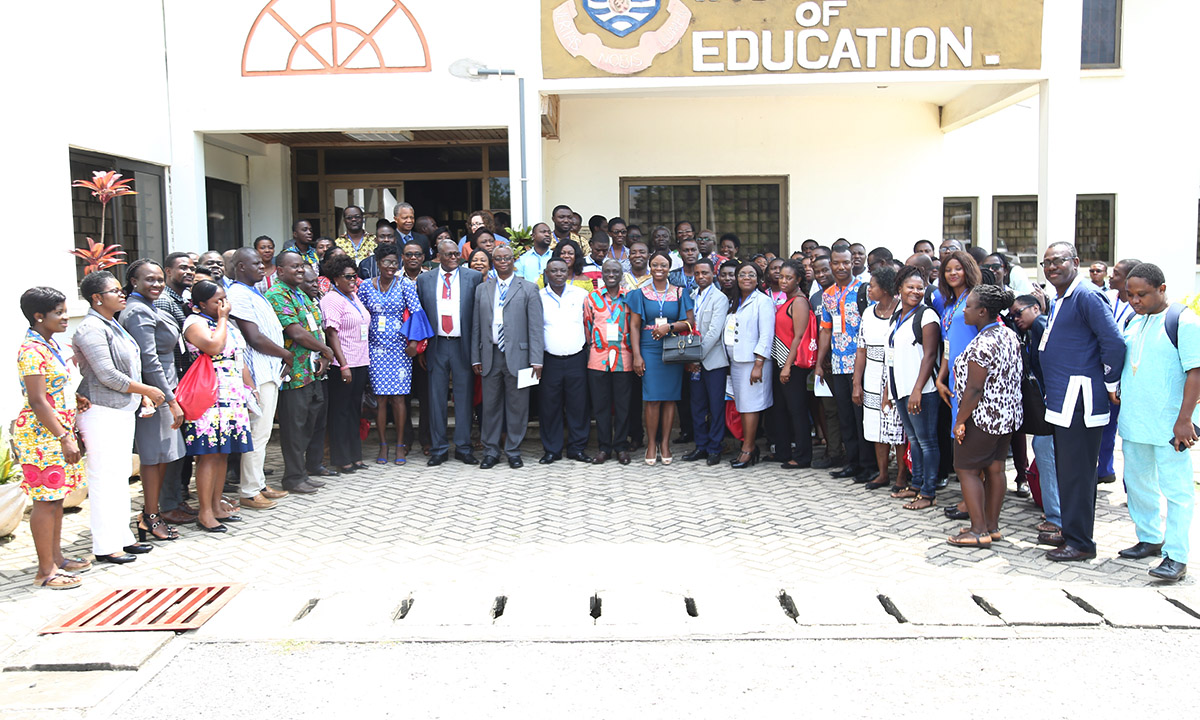UCC, University of Alabama and Central University Hold 1st Joint Symposium
The University of Cape Coast in collaboration with the University of Alabama, United States of America (UA) and Central University (CU), has held the first Joint Symposium on the theme “Social Determinants of Health” on campus.
The one-day Symposium which is the first of a series of symposia by the three institutions was intended to foster international partnerships for research and policy formulation in the area of health.
Enhancing Health Delivery
Opening the Symposium, the Provost of the College of Humanities and Legal Studies, Prof. Eric F. Amuquandoh, commended the three institutions for joining forces to initiate such an educative programme. He was confident that the symposium would create the platform for experts and stakeholders in the health sectors in the USA and Ghana to help discover innovative ways of enhancing health delivery.
Prof. Amuquandoh noted that “health is everybody’s business and it is central to human life”. He noted that there was the need to pay critical attention to social determinants of health such as stigmatisation, values, belief systems, socio-economic conditions among others to fully address issues affecting the health system. “It is as a result of this that the Sustainable Development Goals revolve around health,” he noted.
Health is Related to Development
Delivering the keynote address, the immediate past Provost of the College of Health and Allied Sciences (COHAS), Prof. Harold S. Amonoo-Kuofi, said that health was intrinsically related to the development of just not only the individual but that of the community and the entire nation. “Good health allows people to reach their full potential. Health is a key indicator in the progress of a country and the health and wellbeing all citizens are essential to poverty eradication and achieving sustainable development,” he stated
Prof. Amonoo-Kuofi stated that the first 10 goals of the Sustainable Development Goals (SDGs) were in relation to issues of health adding that “All the SDG interconnect and they relate to social issues and have implications on health”.
Social Determinants of Health
Prof. Amonoo-Kuofi who is also the founding Dean of the School of Medical Sciences explained that “Social determinants of health are conditions, in which people are born, grow, live, work and they are shaped by the distribution of money, power, and resources at global and national levels”. According to him, these determinants impact on wide-ranging of healthy function and quality of health outcome stressing that “The major determinants are responsible for the unfair and avoidable differences in health status which are referred to as health inequities”.
Social Determinants of Health at the Centre Stage of Policy Discussions
The former Provost of COHAS pointed out that social determinants of health have now taken centre stage of policy discussions with emphasis on accountable care, health insurance systems and other initiatives with a focus on increasing population health. He further indicated that many researchers have examined the relative contributions of health care services, genetic behaviours, environment and social factors in promoting health and reducing premature mortality. “Evidence suggests that more medical factors including social behavioural and environmental determinants consistently play a substantial role than medical services. Therefore, if we are to depend on medical services alone, we probably may not achieve quality health”
Prof. Amonoo-Kuofi further indicated that information dating as far back as the 1970s has shown that the poor social determinants of health are harmful both in the short and long term. “The weight of expert opinion and scientific evidence shows that favourable social conditions have a positive impact on health outcomes” he noted. Prof. Amonoo-Kuofi therefore stressed the need to examine available data comprehensively to generate an integrated based policy to address the social determinants in order to help achieve positive health outcomes without increasing health care spending.
Message from Representatives of Partner Universities
A representative of the University of AU, Prof. Lisa Pawloski, thanked UCC for hosting the maiden symposium and indicated that her University was represented by 15 faculties from five colleges. She said the team was representing their respective Deans to strengthen the collaboration among the three institutions. “It is exciting to see these collaborative institutions come together with stakeholders to examine the Social Determinants of Health on the SDGs,” she added.
For his part, Prof. Richard K. Apatu, of CU, was hopeful that the collaboration would yield positive fruits to the benefit to the three institutions.
Presentations
The event offered to stakeholders the opportunity to discuss Healthcare Delivery and Quality of Care, Maternal Child Health and, Disease Management and Mental Health. Others also touched on Coping and Stigma Related to Chronic Diseases, Education and Practice and Translational Research: from Bench to Practice and Policy.


